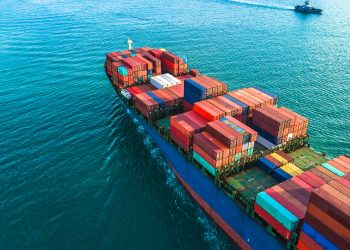Danish shipping giant Maersk issued its sustainability report for 2016, highlighting, among others, key achievements in the area of environmental responsibility, such as reducing emissions from shipping and complying with responsible ship recycling.
Emissions
- In 2016, reductions in CO2 emissions per TEU per km leveled off, as a result of low fuel price and changes in market conditions
- The accumulated emissions reduction since 2007 is 42%, and since 2010 is 25%
- The company targets for for relative CO2 reductions of 30% by 2020 across all businesses
- In 2016, Maersk Line established its first Carbon Pact in Asia, when an agreement was signed with Huawei Technologies, establishing a commitment to reduce Huawei’s CO2 emissions per container transported with Maersk Line by 18% from 2016 to 2020.

Energy efficiency
In 2016, Maersk Drilling completed a two-year energy efficiency pilot project. By installing fuel flow and energy metres and software used in shipping, adapted to a drilling rig, it was possible to optimise the use of auxiliary engines, pumps, power generators, lighting and work practices.
During the pilot, fuel consumption was reduced by 14.2%, which translates into significant reductions in CO2 and other emissions. During 2016, the approach and equipment were implemented on six more rigs, and Maersk Drilling has set up incentive-sharing partnerships with clients.
The company is also testing slow steaming for transporting rigs as well as participating in a research project using flywheel technology for energy storage as part of efforts to lower energy consumption and CO2-emissions.
Ship Recycling
- A.P. Moller – Maersk also established a policy for the responsible recycling of ships in 2009, stating that it will only dismantle vessels and rigs at yards that comply with a strict interpretation of the Hong Kong Convention and who are able and willing to upgrade to their standard within a short timeframe. Between 2009–2015, it recycled 40–50 vessels, the vast majority at facilities in Turkey and China.
- From 2016, it has begun working with yards that have made these investments. When it engages with a yard in Alang, India, the company wants to guarantee that the yard is not only equipped to work responsibly, but will actually implement the means and practices necessary to comply with A.P. Moller – Maersk’s Responsible Ship Recycling Standard (RSRS). The RSRS implies:
-going beyond the Hong Kong Convention in relation to social and anti-corruption issues
-relying on a strict interpretation of the Hong Kong Convention in relation to health, safety and environmental issues
-monitoring compliance by having people on the ground at the yard with a contractual right to stop the work if necessary
- In 2016, Maersk added a new requirement to policy and standard on responsible ship recycling concerning the sale of vessels, to eliminate the financial incentive to recycle irresponsibly. Three options are defined in the policy and applicable to any sale of an A.P. Moller – Maersk vessel:
-If the value of the ship is less than 25% above the highest recycling price, we will not sell off the ship, but instead recycle it ourselves in accordance with our policy
-If the value is between 25–40% above the highest recycling price, we require that the new owner operates the vessel for at least two years after the sale, or recycles it in accordance with our standards
-If the value is more than 40% above the highest recycling price, there are no restrictions on the sale of the vessel, as there is no financial incentive for the buyer to recycle.

Explore more by reading the full report:






























































